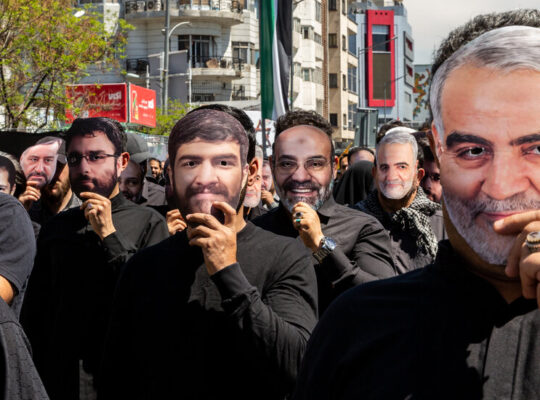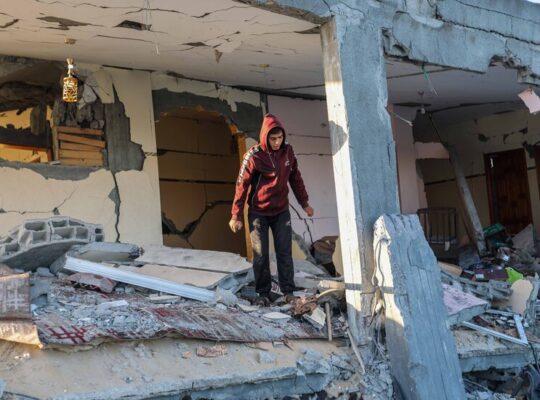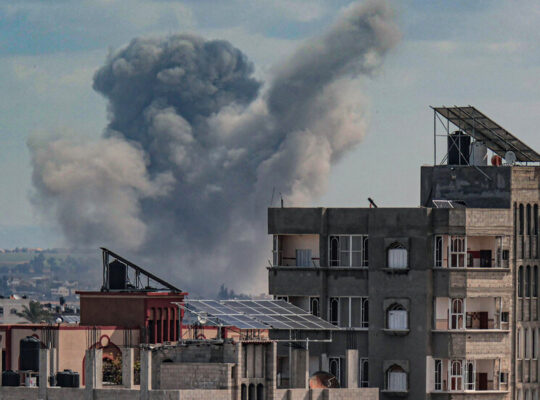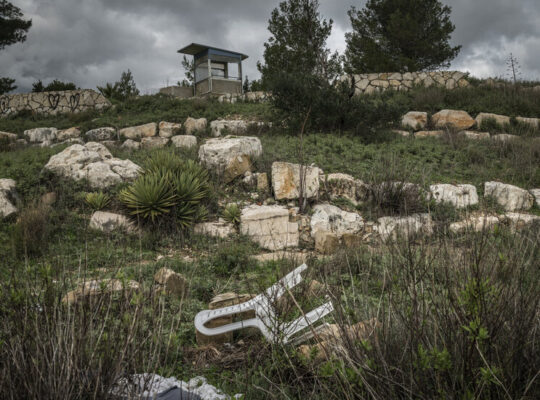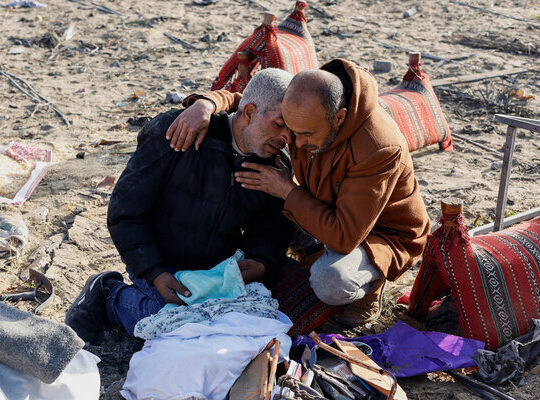[ad_1]
On a Democratic primary debate stage in Brooklyn in 2016, Senator Bernie Sanders caused a ruckus within his party when he rebuked Hillary Clinton for not mentioning Palestinian rights in a speech she made to a pro-Israel lobbying group.
“If we are ever going to bring peace to that region,” Mr. Sanders said in remarks that drew cheers and applause from the audience, “we are going to have to treat the Palestinian people with respect and dignity.” He added, “That does not make me anti-Israel.”
The comment delighted liberal critics of Israel’s policies in the occupied West Bank and Gaza and alarmed mainstream Democrats, who were more accustomed to seeing presidential candidates compete to showcase their airtight alignment with the Jewish state. It was an early indication of what would become a profound divide within the Democratic Party over Israel, pitting young progressives and people of color against older, whiter and more pro-Israel voters, and it positioned Mr. Sanders, the progressive icon from Vermont, on the leading edge of it.
But years later, amid the latest war in Gaza that began after Hamas attacked Israel on Oct. 7, killing 1,200 civilians and taking around 240 people hostage, Mr. Sanders has found himself at odds with many of the same progressive activists and groups who powered his presidential campaigns and once revered him for his willingness to publicly question the actions of the Jewish state.
While Mr. Sanders was one of the first members of Congress to call for a humanitarian pause in the war amid a catastrophic civilian death toll in Gaza caused by Israel’s military offensive, he has rejected calls for a permanent cease-fire. Mr. Sanders, an independent, caucuses with Democrats.
Liberal activists across the country are demanding a cease-fire and have become increasingly vocal in condemning elected officials — including President Biden and many Democrats in Congress — for not doing so, accusing them of devaluing Palestinian lives and enabling unacceptable actions by Israel. But for many progressives, including former staff members on his presidential campaigns, Mr. Sanders’s more moderate tone in the current conflict has been particularly painful and disappointing given his long history of highlighting the plight of the Palestinian people.
While he is far from the only member of Congress facing pressure from the left, the break between a movement’s godfather and many of its activists reflects how bitterly the issue has divided Democrats, and the disillusionment some voters, especially young people, feel about the party as a result of the war.
“Biggest political disappointment of our generation,” Briahna Joy Gray, the national press secretary for Mr. Sanders’s 2020 presidential campaign, wrote about him on X.
“There’s a deep, deep sense of betrayal,” said Nusaiba Mubarak, who organized Muslim and Arab American voters for Mr. Sanders’s 2020 campaign. “He was the one person who, unprovoked, would talk about Gaza and human rights in Gaza, and how the unemployment rate was insanely high because of the 16-year siege on Gaza — and then now to see him really let our people down by not calling for a permanent cease-fire.”
Mr. Sanders, who declined to be interviewed for this story but provided a written response, is acutely aware of the resentment, and has become more vocal about his concerns about Israel’s conduct of the war. In addition to calling in late October for a pause in the fighting, last week he endorsed placing conditions on U.S. aid to Israel, including an end to “indiscriminate bombing” and “a commitment to broad peace talks to advance a two-state solution.” But he has resisted the pressure to side with the progressive left on the issue.
“I do not have all the answers to this never-ending tragedy,” Mr. Sanders said in a speech on the Senate floor on Wednesday evening. “But for those of us who believe in peace, and for those of us who believe in justice, it is imperative that we do our best to provide Israelis and Palestinians with a thoughtful response that maps out a realistic path to addressing the reality we face today.”
In his remarks, Mr. Sanders said he supported an extension of the temporary cease-fire negotiated in exchange for the return of hostages abducted by Hamas, while reiterating his call for conditions on military aid to Israel and emphasizing that Hamas is not a trustworthy negotiating partner in considering a permanent cease-fire.
“The killing of nearly 15,000 Palestinian civilians since the war began is unacceptable, and the United States should not be complicit in the military strategy that has caused that devastation,” Mr. Sanders said in an earlier statement to The New York Times.
“I believe what the majority of Americans and progressives want is an end to the bloodshed and long-term peace, security and justice for the Palestinian and Israeli people, and that is what I am fighting to accomplish,” he added.
Such language has left some of Mr. Sanders’ supporters and progressive activists cold.
“It’s been disappointing to not see him lead on the call for a permanent cease-fire. Confusing, disappointing,” said Daniela Lapidous, who directed the help desk on Mr. Sanders’s 2020 campaign and signed an open letter to Mr. Sanders from his former campaign staff members. “If the person who we have looked to as literally one of the most moral people in the Senate is not calling for a permanent cease-fire now, that’s hard to grapple with.”
Activists urging a permanent cease-fire have cited the estimates of health officials in Gaza that more than 13,000 people have been killed there during Israel’s military campaign. And they say it is vital for figures like Mr. Sanders to embrace the step as a matter of political strategy.
“In this moment, both to retain people — especially young people to the Democratic Party — as well as to actually move the needle on what Israel is willing to do in terms of approaching a permanent cease-fire, it’s actually really, really important to use the words ‘permanent cease-fire now,’ and not set it aside as something that leftists just want because we are attached to a certain word,” Ms. Lapidous said.
Around three-quarters of Democratic voters said the United States should call for a cease-fire and de-escalation of violence in Gaza, according to a Reuters/Ipsos poll. The other two members of Vermont’s congressional delegation, Senator Peter Welch and Representative Becca Balint, both Democrats, have called for a cease-fire, joining more than 30 members of the House and two other Democratic senators, Richard J. Durbin of Illinois and Jeff Merkley of Oregon.
Faiz Shakir, an adviser to Mr. Sanders who served as his campaign manager in 2020, said the clash between the senator and some of his supporters comes from “a natural tension between a movement leader and a political leader” that has dogged Mr. Sanders throughout his career.
“The easiest thing for Bernie Sanders to do would be to just say something to make activists happy. And the fact that he’s not is indicative of how sincerely he approaches this issue in particular,” Mr. Shakir said. “It’s an affirmation that Bernie Sanders doesn’t come to these things with political positioning in mind. He’s actually struggling with the moral dimensions of this.”
Mr. Sanders, who is Jewish and spent time on a kibbutz as a young man, called for a cease-fire between Israel and Hamas in 2021 after 11 days of fighting in Gaza. He has refrained from doing so in the current conflict, arguing that Hamas cannot be trusted to abide by a cease-fire and to relinquish control of Gaza.
Hamas has made it “absolutely clear, before and after Oct. 7, that their goal is the destruction of Israel and perpetual warfare to achieve that end,” Mr. Sanders said in his statement to The Times.
Mr. Shakir said the Hamas attack was personally “jarring” for Mr. Sanders, whose father’s family was killed in the Holocaust.
“As a deeply committed, progressive person that Bernie is, he finds it impossible to advocate for trusting a decidedly unprogressive Hamas,” Mr. Shakir said.
Still, the fact that more Democrats have been willing to criticize Israel’s government and assert Palestinian rights marks a remarkable shift in the party from that moment between Mr. Sanders and Ms. Clinton on the debate stage seven years ago.
As the humanitarian crisis in Gaza has grown, many Democrats including Mr. Biden have recalibrated their message to urge Israel to do more to avoid civilian casualties and support the delivery of more humanitarian aid into Gaza. The Biden administration also played a key role in negotiating a temporary cease-fire and the release of some hostages in exchange for the release of some Palestinian prisoners, and at Mr. Biden’s urging, Israel and Hamas agreed to extend that initial four-day truce agreement by two more days.
And even as divisions among Democrats over policy toward Israel remain deep, few progressives in Congress appear to be pushing Mr. Sanders to change course.
“I know Senator Sanders wants the same things I do: an end to bombing in Gaza, safety for Palestinian and Israeli civilians, a release of all hostages, and a path toward sustainable peace and security,” Ms. Balint, the congresswoman from Vermont who was the first Jewish member of Congress to call for a cease-fire, said in a statement. “I don’t believe use of the term cease-fire is the litmus test for if you care about Palestinians and want an end to this conflict.”
[ad_2]
Source link


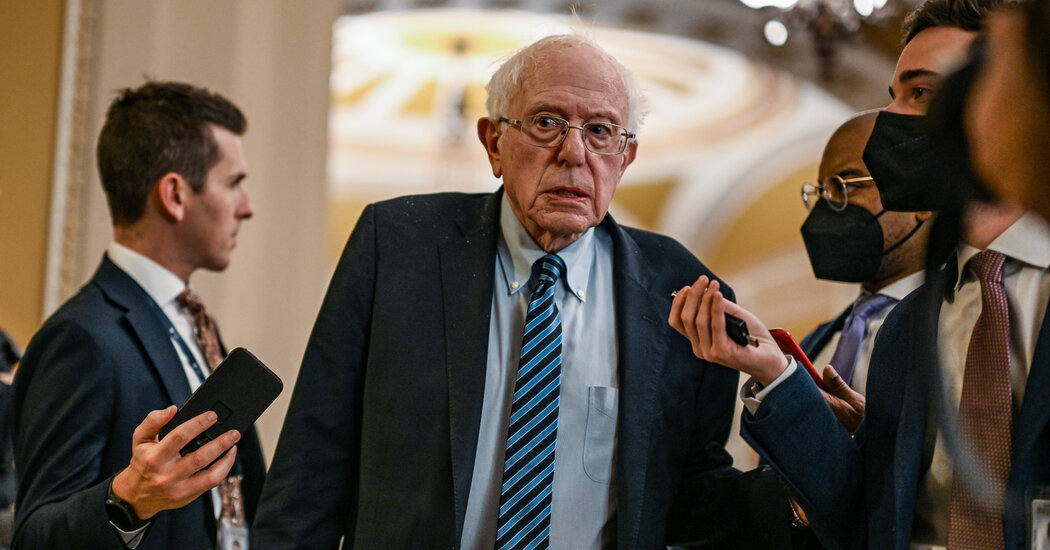
 JEWISH DIGITAL TIMES
JEWISH DIGITAL TIMES